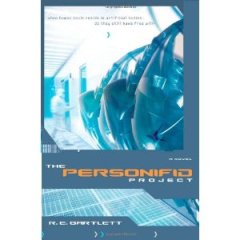 The Personifid Project, by R.E. Bartlett (Realms, 2005)
The Personifid Project, by R.E. Bartlett (Realms, 2005)
Some time in the future, Earth is a baked planet under a yellow sky, oceans rapidly receding. Most people live in domed cities with advanced technology. Not only are robots and androids readily available, many humans have transferred their souls from mortal bodies into “personifids” in the quest of eternal life in more attractive forms.
Aphra is a 23-year-old human whose friends are androids. She always gets her own way, and doesn’t know how to relate to other humans on a personal level. She’s never seen a live dog, either, only the artificial ones.
R.E. Bartlett does a great job of conveying Aphra’s spoiled, self-centred attitude while building reader sympathy. After all, the poor fem’s security is abruptly shattered when the most powerful man in the city sends his cohorts to hunt her down after she hears—and witnesses—his secrets.
The language often feels passive or a touch restrained, but that’s how Aphra views the world. As the novel progresses, she meets other humans and learns to really live. She also learns about the Triune Soul, as humans now call the Trinity.
The Personifid Project is disturbingly similar to our own time’s fascination with personal entertainment devices and virtual friendships. It’s a scary look at where these things could lead us if we’re not wise.
The technology isn’t fully explained—and that would only slow the story. They have flying cars, something called luminires that are like teleporters, and voice-activated computers that can manufacture food and change their owners’ appearance.
This last one confused me, and a bit of explanation would have helped. The best I can figure is, the computer can project over great distances, whether an appearance mask or a personal force-field. I’m not sure that’s the reason, but I enjoyed the story regardless.
The Personifid Project is one of those novels that kept coming back to me when I wasn’t reading, and I finished it more quickly than I expected. Now I’m eager to read the sequel, The Personifid Invasion, published by Marcher Lord Press. Must work through that looming to-read pile first!
R.E. Bartlett is a New Zealand author. The Personifid series are her first published novels. You can read an interview with R.E. Bartlett here.


 Conquerors’ Legacy
Conquerors’ Legacy Conquerors’ Heritage
Conquerors’ Heritage

